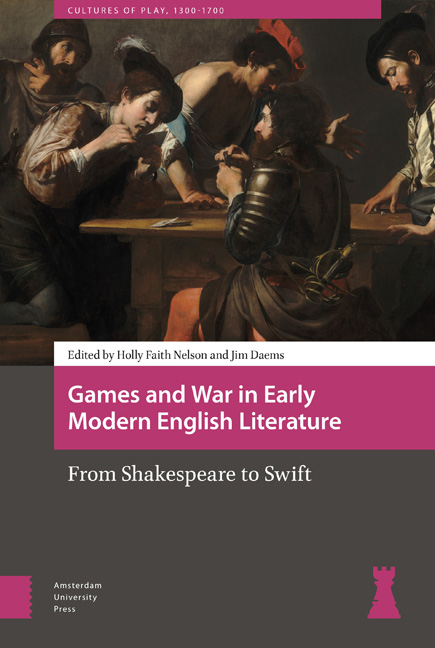Book contents
- Frontmatter
- Dedication
- Contents
- Acknowledgements
- The Interplay of Games and War in Early Modern English Literature: An Introduction
- 1 ‘Can this cock-pit hold the vasty fields of France?’ Cock-Fighting and the Representation of War in Shakespeare’s Henry V
- 2 Game Over: Play and War in Shakespeare’s Troilus and Cressida
- 3 Thomas Morton’s Maypole: Revels, War Games, and Transatlantic Conflict
- 4 Milton’s Epic Games: War and Recreation in Paradise Lost
- 5 Ciphers and Gaming for Pleasure and War
- 6 Virtual Reality, Role Play, and World-Building in Margaret Cavendish’s Literary War Games
- 7 Dice, Jesting, and the ‘Pleasing Delusion’ of Warlike Love in Aphra Behn’s The Luckey Chance
- 8 War and Games in Swift’s Battle of the Books and Gulliver’s Travels
- 9 Time-Servers, Turncoats, and the Hostile Reprint: Considering the Conflict of a Paper War
- Index
8 - War and Games in Swift’s Battle of the Books and Gulliver’s Travels
Published online by Cambridge University Press: 21 November 2020
- Frontmatter
- Dedication
- Contents
- Acknowledgements
- The Interplay of Games and War in Early Modern English Literature: An Introduction
- 1 ‘Can this cock-pit hold the vasty fields of France?’ Cock-Fighting and the Representation of War in Shakespeare’s Henry V
- 2 Game Over: Play and War in Shakespeare’s Troilus and Cressida
- 3 Thomas Morton’s Maypole: Revels, War Games, and Transatlantic Conflict
- 4 Milton’s Epic Games: War and Recreation in Paradise Lost
- 5 Ciphers and Gaming for Pleasure and War
- 6 Virtual Reality, Role Play, and World-Building in Margaret Cavendish’s Literary War Games
- 7 Dice, Jesting, and the ‘Pleasing Delusion’ of Warlike Love in Aphra Behn’s The Luckey Chance
- 8 War and Games in Swift’s Battle of the Books and Gulliver’s Travels
- 9 Time-Servers, Turncoats, and the Hostile Reprint: Considering the Conflict of a Paper War
- Index
Summary
Abstract
Swift's work demonstrates an extensive critique of the efficacy of war, war games, and politics. His satires often portray the ineffectual preparation for war provided by war-gaming and interrogate the orthodox belief in the socio-political correlation between military prowess and political stability. This chapter argues that, in The Battle of the Books and Gulliver's Travels, Swift systematically dismantles the abstract reasoning of war-gaming. He relentlessly critiques, in particular, the philosophical and linguistic abstractions of Leibniz, Descartes, Bacon, and the Royal Society by revealing the consequences of accepting games as factual scenarios rather than theoretical models, an error that results in the physical and moral depredations of actual warfare.
Keywords: language machines in early modern literature; early modern science and language; early modern scientific method; Ancients and Moderns debate
In the Second Voyage of Gulliver's Travels, a curious exchange takes place when the giant king of Brobdingnag quizzes Gulliver on the habits of his countrymen, alluding to the dangerous pastime of ‘Gaming’, a question that mirrors widespread British concerns about the economic and social costs of gambling across the kingdom. However, the conventional moral stance of the question misleads Jonathan Swift's readers, for Gulliver replies with a jeremiad against political violence, revolution, and war:
He was perfectly astonished with the historical Account I gave him of our Affairs during the last Century; protesting it was only an Heap of Conspiracies, Rebellions, Murders, Massacres, Revolutions, Banishments; the very worst Effect that Avarice, Faction, Hypocrisy, Perfidiousness, Cruelty, Rage, Madness, Hatred, Envy, Lust, Malice, and Ambition could produce.
Swift's rhetorical shift from gaming to seventeenth-century wars reveals his disdain for traditional correlations between war games, military success, and political leadership. His satires of war-gaming in The Battle of the Books (1697/1704) and Gulliver's Travels (1725) expose flaws in game design, the limitations of war games for preparing leaders of real wars, and the logical fallacy of valuing military success amongst those charged with maintaining political stability.
Intellectual gaming in general, and war-gaming in particular, requires an abstract semiotic reasoning, in which sign and signified develop increasingly symbolic relationships. While all mammals engage in mock combat as a form of play, only humans engage in abstract games of war in which symbolic relationships are accorded equal meaning and value to actual combat scenarios.
- Type
- Chapter
- Information
- Games and War in Early Modern English LiteratureFrom Shakespeare to Swift, pp. 161 - 178Publisher: Amsterdam University PressPrint publication year: 2019



